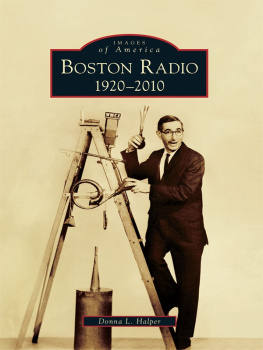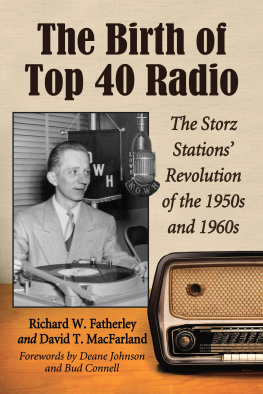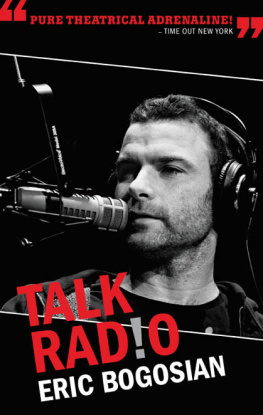CONTENTS
acknowledgments ix introduction 1
i : FiNDING AN AUDiENCE: MARKETING TO FAMiLIES
1. the publicis antennas Markets, Advertising, and the Rise of the Private Station 23
2. opening up the studio doors Fashioning Loyal Audiences from Markets 45
3. family versus liberty Popular Front Programming and the Radio Elections of 1937 71
ii : family values and french identity on the radio
4. around the cradle Family Portraits for the Family Audience 99
5. the perils of the single life Marginalized Working-Class Men and Women at Radios Fictional Center 128
6. boa constrictors, man-eaters, and le cafard : Colonial Landscapes on Metropolitan Radio 160
conclusion 185
appendix a: Educational Classes, Week of March 7, 1937 193
appendix b: Lectures on Public Stations, Week of March 7, 1937 195
notes 201 index 235
ACKNOWLEDGMENTS
When Steven Ungar first handed me a cassette tape of French film music in a graduate class in 1995, I little imagined it would lead to a book on interwar radio. And I cannot conceive of having written that book without a tremendous amount of help, friendship, and encouragement from others.
At Iowa, Sarah Farmer gave me the insight to work through tough ideas and the space to let them grow. She challenged me to push my ideas to their limits and kept me moving forward with my work. Steven Ungar and Rosemarie Scullion took in a green historian, helped show me the ropes in cultural studies, allowed me to attend their classes with French graduate students, and, with great patience, plowed through my research papers and offered thoughtful critiques of my work. My fellow graduate students helped me at every turn. Members of several writing groups always had inspiring ideas after careful readings of my chapter drafts: Michelle Rhoades, Nat Godley, Paul Young, Bridget Williams-Searle, John Williams-Searle, and John McCurley. Lawrence Sohner, Lars Peterson, Erin Jordan, Sara Kimble, and Andrea Gayoso offered advice and great friendship to sustain me through the long Iowa winters.
Since coming to the Citadel I have had generous research and presentation fellowships from the Citadel Foundation that have allowed me to continue work on my project. The support and advice I received from my colleagues has been remarkable. I wish to thank them all, but especially Bo Moore, Jeff Pilcher, Keith Knapp, Blaine Roberts, and Kathy Grenier, who read drafts, gave feedback, and made my progress on the work so much easier. At Louisiana State University Press, Alisa Plant has guided me with aplomb.
I have many people to thank in France. Cecile Meadel at the Ecole des Mines gave her time to a curious graduate student searching for documents on her topic. Rosanne Lelievre and the staff at the Inatheque de France allowed me the honor of listening to interwar recordings at the Maison de la Radio. I will never forget the unexpected joy, after hooking up a reel-to-reel, of hearing Maurice Chevalier joking about riding a bicycle along the Riviera. Friends and colleagues I ran into at the Cafe des Temps at the Bibliotheque de France made my trips to Paris an intellectual and cultural highlight: Paula Lee, Rachel Fuchs, Philip Whalen, Becky Pulju, Sarah Hanley, and Shannon Fogg among others. I thank also the numerous friends and colleagues who, at every stage, provided advice and support: Brett Bowles, Robin Walz, Jeff Horn, Jen Popeil, Vanessa Schwartz, and Jonathyne Briggs. Rachel Bohlmann, since our first days of graduate school, has always let me bounce ideas off her and led me to think imaginatively about the role of gender in my story.
My two families deserve special thanks. First, my French family, Jean Lambert, Karine and Olivier Dufour, and Claire Collet, whose love and care gave me a real home in Paris and in Suze. And my parents, Pris and Alan Neulander, who kept me flying ahead, knowing there was always a place I could land.
And, most of all, to Kurt Boughan. There is no measure of gratitude that could ever be enough.
PROGRAMMING NATIONAL IDENTITY
introduction
Two stories to begin.
The first:
One night at a house in Neuilly, in the bourgeois outskirts of Paris, Helene begs her husband to stay home from the theater because she can sense, in innate feminine ways, that something awful will happen to her that evening if she is left alone. Jacques laughs off his wifes fears, calling her hysterical and in need of a psychiatrists care. He tells his friend Roger that his wife is afraid of everything and has a nervous condition and so must be taught a lesson to prevent her outbursts in the future. They lock Helene in her bedroom and pretend to leave the house. That night, their maids lover sneaks into the house to rob it and murders Helene because he expected to find himself alone and everyone at the theater. Sitting in the living room, Jacques and Roger hear Helenes screams but do nothing, as they assume she is exaggerating her fears. They realize she has died only when the screaming stops and the murderer has escaped out of her bedroom window.1
The second:
One morning at Radio-Cite, a radio studio on the Champs-Elysees in Paris, the mail arrives full of boxes of throat lozenges. A few nights before, worried listeners had heard one of the announcers coughing and speaking with a frog in his throat. They send their good wishes, medicine, and home remedies for his speedy recovery. In response, the announcer thanks his loyal audience on the air.2
These two stories, one fictional, one allegedly true, speak to the rising audio culture in interwar France. The first story is the plot of a 1937 radio play by Jacques Cossin and Jose de Berys titled Fear. The authors, regular radio playwrights and actors on Jacques Cossins Half Hour of Crime Drama and Adventure, a series that could be heard on French public radio between 1936 and 1939, assumed certain female behaviors. They created, and a woman performed the role of, a character whose innate female traits both allowed her to sense danger and ultimately put her in its path. A hysterical woman, upsetting her husband too often, could be murdered in her own home, within earshot of her own family. The authors and actors had to suppose that interwar French radio audiences would understand their characters and their play and at the same time would be frightened by the action.
Central to the plot of this radio play are suppositions about the sanctity of the home. For the payoffa frightening murder that would shock listeners the audience had to understand the home as an inviolable domestic space in which carnage and mayhem should not have ensued. The popularity of the play and the whole adventure and crime drama series depended on the idea that radio listeners wanted a safe shock. Plays could frighten or astonish them for a moment, but audiences had to be assured that after the play their own homes remained secure spaces for their families and domestic life. Audiences would listen only if the stories were exciting and unusual and if they felt safe while being scared: the stories had to contain a reassurance that such atrocities would not actually occur.
The response to the announcer with a cold shows the extent to which audiences embraced radio and its attendant personalities and brought them into the warmth of their homes and lives. Radio programmers, working for either businessmen or the state, envisioned French listeners as family groups, located squarely inside the home. They had good reason for doing so, as our second story tells us. Radio listeners thought solicitously of those they heard on the radio. They wished (or the radio owners wanted them to wish) to treat them as family, to take care of them as they would their relatives, neighbors, and friends. As ownership statistics show, listeners had listened in intimate groups and thought of programming in domestic terms. Individual families and households owned the majority of radios. At the end of the decade, only about fifty-four thousand of 5 million radios taxed in France were located in public spaces.3 The idea of the family audience drove radios cultural production and the plays and songs on the airwaves. The radio programs and their sponsoring advertisers spoke directly to the French peoplefamilies, in particularthrough songs, comedies, dramas, and news.
Next page








